In creating long term relationships business leaders are oft
In creating long term relationships business leaders are often troubled with unethical decisions. How do you plan to be a Christian business leader, while remaining loyal to your Christian beliefs? Give supporting biblical passages
Solution
While people tend to claim that lying is immoral, both men and woman are more likely to lie to a woman when engaged in negotiation. The report also mentioned a test involving an ethical issue. In this scenario, the seller of a house does not want it sold to someone who will turn the property into a condo. However, a potential buyer wants to do just that. The findings were that men were more likely than women to lie to sell the house.
It was also found that men tend to be egocentric in their ethical reasoning. That is, if the man will be harmed by something, then it is regarded as unethical. If the man benefits, he is more likely to see it as a grey area. So, in the case of the house scenario, a man representing the buyer would tend to regard lying to the seller as acceptable—after all, he would thus get a sale. However, a man representing the seller would be more likely to regard being lied to as unethical.
In another test of ethics, people were asked about their willingness to include an inferior ingredient in a product that would hurt people but would allow a significant product. The men were more willing than the women to regard this as acceptable. In fact, the women tended to regard this sort of thing as outrageous.
These results provide two reasons why women would be less likely to be in business than men. The first is that men are apparently rather less troubled by unethical, but more profitable, decisions. The idea that having “moral flexibility” (and getting away with it) provides advantage is a rather old one and was ably defended by Glaucon in Plato’s Republic. If a person with such moral flexibility needs to lie to gain an advantage, he can lie freely. If a bribe would serve his purpose, he can bribe. If a bribe would not suffice and someone needs to have a tragic “accident”, then he can see to it that the “accident” occurs. To use an analogy, a morally flexible person is like a craftsperson that has just the right tool for every occasion. Just as the well-equipped craftsperson has a considerable advantage over a less well equipped crafts person, the morally flexible person has a considerable advantage over those who are more constrained by ethics. If women are, in general, more constrained by ethics, then they would be less likely to remain in business because they would be at a competitive disadvantage. The ethical difference might also explain why women are less likely to go into business—it seems to be a general view that unethical activity is not uncommon in business, hence if women are generally more ethical than men, then they would be more inclined to avoid business.
It could be countered that Glaucon is in error and that being unethical (while getting away with it) does not provide advantages. Obviously, getting caught and significantly punished for unethical behavior is not advantageous—but it is not the unethical behavior that causes the problem. Rather, it is getting caught and punished. After all, Glaucon does note that being unjust is only advantageous when one can get away with it. Socrates does argue that being ethical is superior to being unethical, but he does not do so by arguing that the ethical person will have greater material success.
This is not to say that a person cannot be ethical and have material success. It is also not to say that a person cannot be ethically flexible and be a complete failure. The claim is that ethical flexibility provides a distinct advantage.
It could also be countered that there are unethical women and ethical men. The obvious reply is that this claim is true—it has not been asserted that all men are unethical or that all women are ethical. Rather, it seems that women are generally more ethical than men.
It might be countered that the ethical view assumed in this essay is flawed. For example, it could be countered that what matters is profit and the means to this end are thus justified. As such, using inferior ingredients in a medicine so as to make a profit at the expense of the patients would not be unethical, but laudable. After all, as Hobbes said, profit is the measure of right. As such, women might well be avoiding business because they are unethical on this view.
The second is that women are more likely to be lied to in negotiations. If true, this would certainly put women at a disadvantage in business negotiations relative to men since women would be more likely to be subject to attempts at deceit. This, of course, assumes that such deceit would be advantageous in negotiations. While there surely are cases in which deceit would be disadvantageous, it certainly seems that deceit can be a very useful technique.
If it is believed that having more women in business is desirable (which would not be accepted by everyone), then there seem to be two main options. The first is to endeavor to “cure” women of their ethics—that is, make them more like men. The second would be to endeavor to make business more ethical. This would presumably also help address the matter of lying to women.
w could top-level executives at the Manville Corporation have suppressed evidence for decades that proved that asbestos inhalation was killing their own employees?
What could have driven the managers of Continental Illinois Bank to pursue a course of action that threatened to bankrupt the institution, ruined its reputation, and cost thousands of innocent employees and investors their jobs and their savings?
How can we explain the misbehavior that took place in these organizations—or in any of the others, public and private, that litter our newspapers’ front pages: workers at a defense contractor who accused their superiors of falsifying time cards; alleged bribes and kickbacks that honeycombed New York City government; a company that knowingly marketed an unsafe birth control device; the decision-making process that led to the space shuttle Challenger tragedy.
The stories are always slightly different; but they have a lot in common since they’re full of the oldest questions in the world, questions of human behavior and human judgment applied in ordinary day-to-day situations. Reading them we have to ask how usually honest, intelligent, compassionate human beings could act in ways that are callous, dishonest, and wrongheaded.
In my view, the explanations go back to four rationalizations that people have relied on through the ages to justify questionable conduct: believing that the activity is not “really” illegal or immoral; that it is in the individual’s or the corporation’s best interest; that it will never be found out; or that because it helps the company the company will condone it. By looking at these rationalizations in light of these cases, we can develop some practical rules to more effectively control managers’ actions that lead to trouble—control, but not eliminate. For the hard truth is that corporate misconduct, like the lowly cockroach, is a plague that we can suppress but never exterminate.
Three Cases
Amitai Etzioni, professor of sociology at George Washington University, recently concluded that in the last ten years, roughly two-thirds of America’s 500 largest corporations have been involved, in varying degrees, in some form of illegal behavior. By taking a look at three corporate cases, we may be able to identify the roots of the kind of misconduct that not only ruins some people’s lives, destroys institutions, and gives business as a whole a bad name but that also inflicts real and lasting harm on a large number of innocent people. The three cases that follow should be familiar. I present them here as examples of the types of problems that confront managers in all kinds of businesses daily.
Manville Corporation
A few years ago, Manville (then Johns Manville) was solid enough to be included among the giants of American business. Today Manville is in the process of turning over 80% of its equity to a trust representing people who have sued or plan to sue it for liability in connection with one of its principal former products, asbestos. For all practical purposes, the entire company was brought down by questions of corporate ethics.
More than 40 years ago, information began to reach Johns Manville’s medical department—and through it, the company’s top executives—implicating asbestos inhalation as a cause of asbestosis, a debilitating lung disease, as well as lung cancer and mesothelioma, an invariably fatal lung disease. Manville’s managers suppressed the research. Moreover, as a matter of policy, they apparently decided to conceal the information from affected employees. The company’s medical staff collaborated in the cover-up, for reasons we can only guess at.
Money may have been one motive. In one particularly chilling piece of testimony, a lawyer recalled how 40 years earlier he had confronted Manville’s corporate counsel about the company’s policy of concealing chest X-ray results from employees. The lawyer had asked, “Do you mean to tell me you would let them work until they dropped dead?” The reply was, “Yes, we save a lot of money that way.”
Based on such testimony, a California court found that Manville had hidden the asbestos danger from its employees rather than looking for safer ways to handle it. It was less expensive to pay workers’ compensation claims than to develop safer working conditions. A New Jersey court was even blunter: it found that Manville had made a conscious, cold-blooded business decision to take no protective or remedial action, in flagrant disregard of the rights of others.
How can we explain this behavior? Were more than 40 years’ worth of Manville executives all immoral?
Such an answer defies common sense. The truth, I think, is less glamorous—and also less satisfying to those who like to explain evil as the actions of a few misbegotten souls. The people involved were probably ordinary men and women for the most part, not very different from you and me. They found themselves in a dilemma, and they solved it in a way that seemed to be the least troublesome, deciding not to disclose information that could hurt their product. The consequences of what they chose to do—both to thousands of innocent people and, ultimately, to the corporation—probably never occurred to them.
The Manville case illustrates the fine line between acceptable and unacceptable managerial behavior. Executives are expected to strike a difficult balance—to pursue their companies’ best interests but not overstep the bounds of what outsiders will tolerate.
Even the best managers can find themselves in a bind, not knowing how far is too far. In retrospect, they can usually easily tell where they should have drawn the line, but no one manages in retrospect. We can only live and act today and hope that whoever looks back on what we did will judge that we struck the proper balance. In a few years, many of us may be found delinquent for decisions we are making now about tobacco, clean air, the use of chemicals, or some other seemingly benign substance. The managers at Manville may have believed that they were acting in the company’s best interests, or that what they were doing would never be found out, or even that it wasn’t really wrong. In the end, these were only rationalizations for conduct that brought the company down.
Continental Illinois Bank
Until recently the ninth largest bank in the United States, Continental Illinois had to be saved from insolvency because of bad judgment by management. The government bailed it out, but at a price. In effect it has been socialized: about 80% of its equity now belongs to the Federal Deposit Insurance Corporation. Continental seems to have been brought down by managers who misunderstood its real interests. To their own peril, executives focused on a single-minded pursuit of corporate ends and forgot about the means to the ends.
In 1976, Continental’s chairman declared that within five years the magnitude of its lending would match that of any other bank. The goal was attainable; in fact, for a time, Continental reached it. But it dictated a shift in strategy away from conservative corporate financing and toward aggressive pursuit of borrowers. So Continental, with lots of lendable funds, sent its loan officers into the field to buy loans that had originally been made by smaller banks that had less money.
The practice in itself was not necessarily unsound. But some of the smaller banks had done more than just lend money—they had swallowed hook, line, and sinker the extravagant, implausible dreams of poorly capitalized oil producers in Oklahoma, and they had begun to bet enormous sums on those dreams. Eventually, a cool billion dollars’ worth of those dreams found their way into Continental’s portfolio, and a cool billion dollars of depositors’ money flowed out to pay for them. When the price of oil fell, a lot of dry holes and idle drilling equipment were all that was left to show for most of the money.
Continental’s officers had become so entranced by their lending efforts’ spectacular results that they hadn’t looked deeply into how they had been achieved. Huge sums of money were lent at fat rates of interest. If the borrowers had been able to repay the loans, Continental might have become the eighth or even the seventh largest bank in the country. But that was a very big “if.” Somehow there was a failure of control and judgment at Continental—probably because the officers who were buying those shaky loans were getting support and praise from their superiors. Or at least they were not hearing enough tough questions about them.
At one point, for example, Continental’s internal auditors stumbled across the fact that an officer who had purchased $800 million in oil and gas loans from the Penn Square Bank in Oklahoma City had also borrowed $565,000 for himself from Penn Square. Continental’s top management investigated and eventually issued a reprimand. The mild rebuke reflected the officer’s hard work and the fact that the portfolio he had obtained would have yielded an average return of nearly 20% had it ever performed as planned. In fact, virtually all of the $800 million had to be written off. Management chose to interpret the incident charitably; federal prosecutors later alleged a kickback.
On at least two other occasions, Continental’s own control mechanisms flashed signals that something was seriously wrong with the oil and gas portfolio. A vice president warned in a memo that the documentation needed to verify the soundness of many of the purchased loans had simply never arrived. Later, a junior loan officer, putting his job on the line, went over the heads of three superiors to tell a top executive about the missing documentation. Management chose not to investigate. After all, Continental was doing exactly what its chairman had said it would do: it was on its way to becoming the leading commercial lender in the United States. Oil and gas loans were an important factor in that achievement. Stopping to wait for paperwork to catch up would only slow down reaching the goal.
Eventually, however, the word got out about the instability of the bank’s portfolio, which led to a massive run on its deposits. No other bank was willing to come to the rescue, for fear of being swamped by Continental’s huge liabilities. To avoid going under, Continental in effect became a ward of the federal government. The losers were the bank’s shareholders, some officers who lost their jobs, at least one who was indicted, and some 2,000 employees (about 15% of the total) who were let go, as the bank scaled down to fit its diminished assets.
Once again, it is easy for us to sit in judgment after the fact and say that Continental’s loan officers and their superiors were doing exactly what bankers shouldn’t do: they were gambling with their depositors’ money. But on another level, this story is more difficult to analyze—and more generally a part of everyday business. Certainly part of Continental’s problem was neglect of standard controls. But another dimension involved ambitious corporate goals. Pushed by lofty goals, managers could not see clearly their real interests. They focused on ends, overlooked the ethical questions associated with their choice of means—and ultimately hurt themselves.
E.F. Hutton
The nation’s second largest independent broker, E.F. Hutton & Company, recently pleaded guilty to 2,000 counts of mail and wire fraud. It had systematically bilked 400 of its banks by drawing against uncollected funds or in some cases against nonexistent sums, which it then covered after having enjoyed interest-free use of the money. So far, Hutton has agreed to pay a fine of $2 million as well as the government’s investigation costs of $750,000. It has set up an $8 million reserve for restitution to the banks—which may not be enough. Several officers have lost their jobs, and some indictments may yet follow.
But worst of all, Hutton has tarnished its reputation, never a wise thing to do—certainly not when your business is offering to handle other people’s money. Months after Hutton agreed to appoint new directors—as a way to give outsiders a solid majority on the board—the company couldn’t find people to accept the seats, in part because of the bad publicity.
Apparently Hutton’s branch managers had been encouraged to pay close attention to cash management. At some point, it dawned on someone that using other people’s money was even more profitable than using your own. In each case, Hutton’s overdrafts involved no large sums. But cumulatively, the savings on interest that would otherwise have been owed to the banks was very large. Because Hutton always made covering deposits, and because most banks did not object, Hutton assured its managers that what they were doing was sharp—and not shady. They presumably thought they were pushing legality to its limit without going over the line. The branch managers were simply taking full advantage of what the law and the bankers’ tolerance permitted. On several occasions, the managers who played this game most astutely were even congratulated for their skill.
Hutton probably will not suffer a fate as drastic as Manville’s or Continental Illinois’s. Indeed, with astute damage control, it can probably emerge from this particular embarrassment with only a few bad memories. But this case has real value because it is typical of much corporate misconduct. Most improprieties don’t cut a corporation off at the knees the way Manville’s and Continental Illinois’s did. In fact, most such actions are never revealed at all—or at least that’s how people figure things will work out. And in many cases, a willingness to gamble thus is probably enhanced by the rationalization—true or not—that everyone else is doing something just as bad or would if they could; that those who wouldn’t go for their share are idealistic fools.
Four Rationalizations
Why do managers do things that ultimately inflict great harm on their companies, themselves, and people on whose patronage or tolerance their organizations depend? These three cases, as well as the current crop of examples in each day’s paper, supply ample evidence of the motivations and instincts that underlie corporate misconduct. Although the particulars may vary—from the gruesome dishonesty surrounding asbestos handling to the mundanity of illegal money management—the motivating beliefs are pretty much the same. We may examine them in the context of the corporation, but we know that these feelings are basic throughout society; we find them wherever we go because we take them with us.
When we look more closely at these cases, we can delineate four commonly held rationalizations that can lead to misconduct:
A belief that the activity is within reasonable ethical and legal limits—that is, that it is not “really” illegal or immoral.
A belief that the activity is in the individual’s or the corporation’s best interests—that the individual would somehow be expected to undertake the activity.
A belief that the activity is “safe” because it will never be found out or publicized; the classic crime-and-punishment issue of discovery.
A belief that because the activity helps the company the company will condone it and even protect the person who engages in it.
Put enough people in an ambiguous, ill-defined situation, and some will conclude that whatever hasn’t been labeled specifically wrong must be OK—especially if they are rewarded for certain acts. Deliberate overdrafts, for example, were not proscribed at Hutton. Since the company had not spelled out their illegality, it could later plead guilty for itself while shielding its employees from prosecution.
Top executives seldom ask their subordinates to do things that both of them know are against the law or imprudent. But company leaders sometimes leave things unsaid or give the impression that there are things they don’t want to know about. In other words, they can seem, whether deliberately or otherwise, to be distancing themselves from their subordinates’ tactical decisions in order to keep their own hands clean if things go awry. Often they lure ambitious lower level managers by implying that rich rewards await those who can produce certain results—and that the methods for achieving them will not be examined too closely. Continental’s simple wrist-slapping of the officer who was caught in a flagrant conflict of interest sent a clear message to other managers about what top management really thought was important.
How can managers avoid crossing a line that is seldom precise? Unfortunately, most know that they have overstepped it only when they have gone too far. They have no reliable guidelines about what will be overlooked or tolerated or what will be condemned or attacked. When managers must operate in murky borderlands, their most reliable guideline is an old principle: when in doubt, don’t.
That may seem like a timid way to run a business. One could argue that if it actually took hold among the middle managers who run most companies, it might take the enterprise out of free enterprise. But there is a difference between taking a worthwhile economic risk and risking an illegal act to make more money.
The difference between becoming a success and becoming a statistic lies in knowledge—including self-knowledge—not daring. Contrary to popular mythology, managers are not paid to take risks; they are paid to know which risks are worth taking. Also, maximizing profits is a company’s second priority, not its first. The first is ensuring its survival.
All managers risk giving too much because of what their companies demand from them. But the same superiors who keep pressing you to do more, or to do it better, or faster, or less expensively, will turn on you should you cross that fuzzy line between right and wrong. They will blame you for exceeding instructions or for ignoring their warnings. The smartest managers already know that the best answer to the question, “How far is too far?” is don’t try to find out.
Ambitious managers look for ways to attract favorable attention, something to distinguish them from other people. So they try to outperform their peers. Some may see that it is not difficult to look remarkably good in the short run by avoiding things that pay off only in the long run. For example, you can skimp on maintenance or training or customer service, and you can get away with it—for a while.
The sad truth is that many managers have been promoted on the basis of “great” results obtained in just those ways, leaving unfortunate successors to inherit the inevitable whirlwind. Since this is not necessarily a just world, the problems that such people create are not always traced back to them. Companies cannot afford to be hoodwinked in this way. They must be concerned with more than just results. They have to look very hard at how results are obtained.
Evidently, in Hutton’s case there were such reviews, but management chose to interpret favorably what government investigators later interpreted unfavorably. This brings up another dilemma: management quite naturally hopes that any of its borderline actions will be overlooked or at least interpreted charitably if noticed. Companies must accept human nature for what it is and protect themselves with watchdogs to sniff out possible misdeeds.
An independent auditing agency that reports to outside directors can play such a role. It can provide a less comfortable, but more convincing, review of how management’s successes are achieved. The discomfort can be considered inexpensive insurance and serve to remind all employees that the real interests of the company are served by honest conduct in the first place.
We know that conscience alone does not deter everyone. For example, First National Bank of Boston pleaded guilty to laundering satchels of $20 bills worth $1.3 billion. Thousands of satchels must have passed through the bank’s doors without incident before the scheme was detected. That kind of heavy, unnoticed traffic breeds complacency.
How can we deter wrongdoing that is unlikely to be detected? Make it more likely to be detected. Had today’s “discovery” process—in which plaintiff’s attorneys can comb through a company’s records to look for incriminating evidence—been in use when Manville concealed the evidence on asbestosis, there probably would have been no cover-up. Mindful of the likelihood of detection, Manville would have chosen a different course and could very well be thriving today without the protection of the bankruptcy courts.
The most effective deterrent is not to increase the severity of punishment for those caught but to heighten the perceived probability of being caught in the first place. For example, police have found that parking an empty patrol car at locations where motorists often exceed the speed limit reduces the frequency of speeding. Neighborhood “crime watch” signs that people display decrease burglaries.
Simply increasing the frequency of audits and spot checks is a deterrent, especially when combined with three other simple techniques: scheduling audits irregularly, making at least half of them unannounced, and setting up some checkups soon after others. But frequent spot checks cost more than big sticks, a fact that raises the question of which approach is more cost-effective.
A common managerial error is to assume that because frequent audits uncover little behavior that is out of line, less frequent, and therefore less costly, auditing is sufficient. But this condition overlooks the important deterrent effect of frequent checking. The point is to prevent misconduct, not just to catch it.
A trespass detected should not be dealt with discreetly. Managers should announce the misconduct and how the individuals involved were punished. Since the main deterrent to illegal or unethical behavior is the perceived probability of detection, managers should make an example of people who are detected.
That seems to be what happened at Manville. A small group of executives and a succession of corporate medical directors kept the facts about the lethal qualities of asbestos from becoming public knowledge for decades, and they managed to live with that knowledge. And at Manville, the company—or really, the company’s senior management—did condone their decision and protect those employees.
Something similar seems to have happened at General Electric. When one of its missile projects ran up costs greater than the air force had agreed to pay, middle managers surreptitiously shifted those costs to projects that were still operating under budget. In this case, the loyalty that ran amok was primarily to the division: managers want their units’ results to look good. But GE, with one of the finest reputations in U.S. industry, was splattered with scandal and paid a fine of $1.04 million.
One of the most troubling aspects of the GE case is the company’s admission that those involved were thoroughly familiar with the company’s ethical standards before the incident took place. This suggests that the practice of declaring codes of ethics and teaching them to managers is not enough to deter unethical conduct. Something stronger is needed.
Top management has a responsibility to exert a moral force within the company. Senior executives are responsible for drawing the line between loyalty to the company and action against the laws and values of the society in which the company must operate. Further, because that line can be obscured in the heat of the moment, the line has to be drawn well short of where reasonable men and women could begin to suspect that their rights had been violated. The company has to react long before a prosecutor, for instance, would have a strong enough case to seek an indictment.
Executives have a right to expect loyalty from employees against competitors and detractors, but not loyalty against the law, or against common morality, or against society itself. Managers must warn employees that a disservice to customers, and especially to innocent bystanders, cannot be a service to the company. Finally, and most important of all, managers must stress that excuses of company loyalty will not be accepted for acts that place its good name in jeopardy. To put it bluntly, superiors must make it clear that employees who harm other people allegedly for the company’s benefit will be fired.
The most extreme examples of corporate misconduct were due, in hindsight, to managerial failures. A good way to avoid management oversights is to subject the control mechanisms themselves to periodic surprise audits, perhaps as a function of the board of directors. The point is to make sure that internal audits and controls are functioning as planned. It’s a case of inspecting the inspectors and taking the necessary steps to keep the controls working efficiently. Harold Geneen, former head of ITT, has suggested that the board should have an independent staff, something analogous to the Government Accounting Office, which reports to the legislative rather than the executive branch. In the end, it is up to top management to send a clear and pragmatic message to all employees that good ethics is still the foundation of good business.
In a business world where \"greed is good\" and it seems like success and integrity are incompatible, how can you live out your Christian faith? What does it really mean to be a Christian in the workplace?
Remember that having a job is a blessing from God. If you claim to be a Christian but are always complaining, what does that say to your co-workers. Sure, everyone has tough days, and it\'s okay to admit it when you\'re struggling, but keep your overall attitude positive by reminding yourself that your job is a gift from God.
Treat others with respect. The highest value of the Christian faith is love. That doesn\'t mean you go around hugging people, it means you treat them with respect, value their opinions, treat them like you\'d want to be treated. In his book The Little Red Book of Wisdom, Mark DeMoss offers this advice: \"In going about the work God gives us, we must treat every person well, regardless of station or potential benefit to us. Let us stay keenly aware of the endless ripple of just being ourselves.\"
Remember the big picture: while it may seem like those who cheat or lie get ahead, in the long run, that often catches up with them. And ultimately, everyone answers to God about the choices they make in this life.
Get clear on your core beliefs. One of the most fundamental beliefs of the Christian faith is that each ordinary believer represents the faith as much as a pastor does. That doesn\'t mean you have to preach, but do your job with integrity. That means being honest, even if it costs you something. DeMoss writes: \"Even when it comes at a high cost, honesty is always a bargain.\"
Jesus came to serve, and his followers imitate him. Serving others without bragging about it is a sign a great strength. DeMoss writes: \"Great leaders are first of all great servants--and great service is modest, understated, in speech and action. Understatement is self-restraint, and self-restrain is hardly a sign of weakness. On the contrary, wisely used, few things carry more power.\"
Pray. It\'s not easy to live with integrity and to do your job with a good attitude. But God gives wisdom to those who ask, and will help you to live your faith, if you pray and ask him!
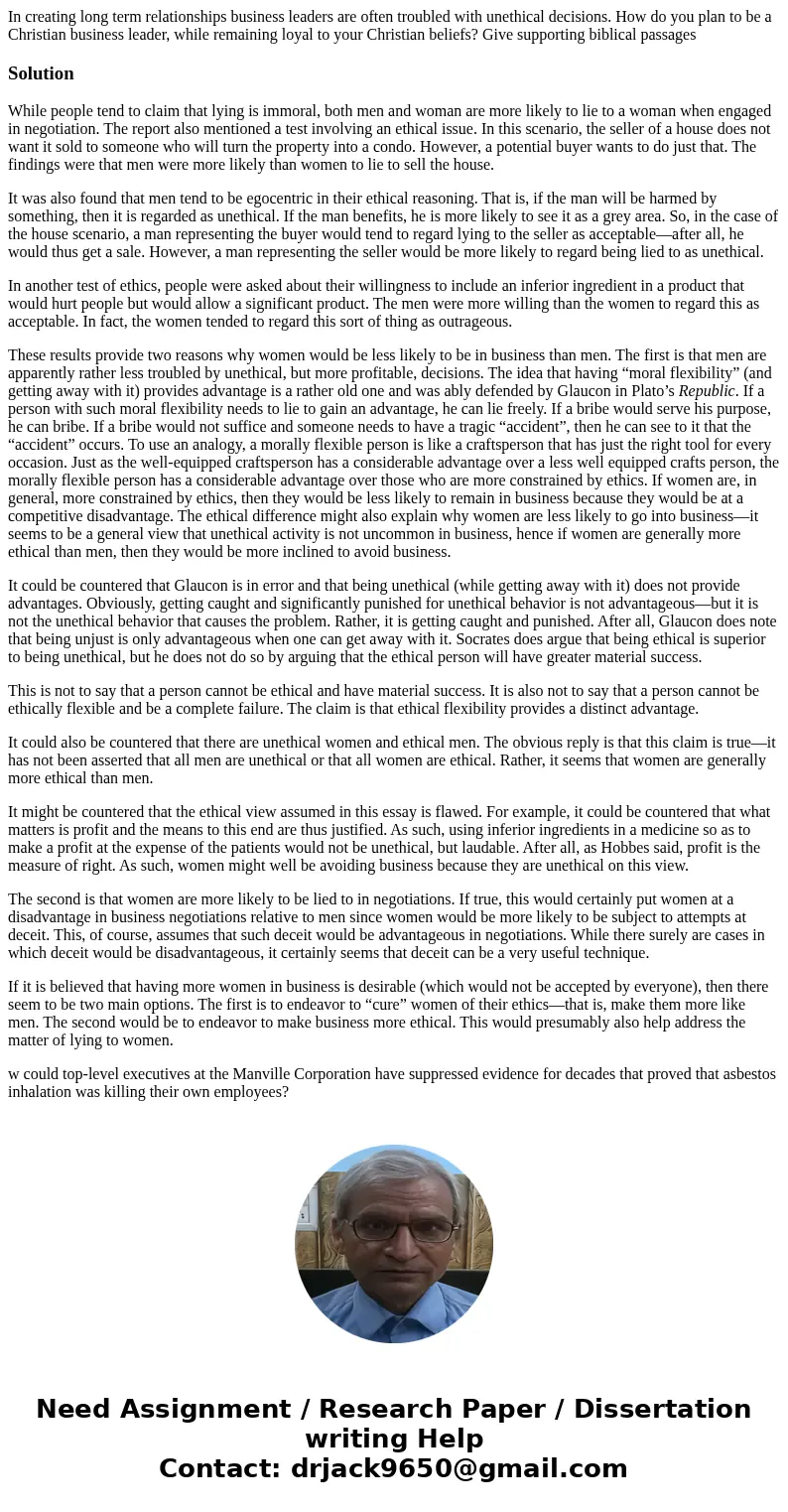
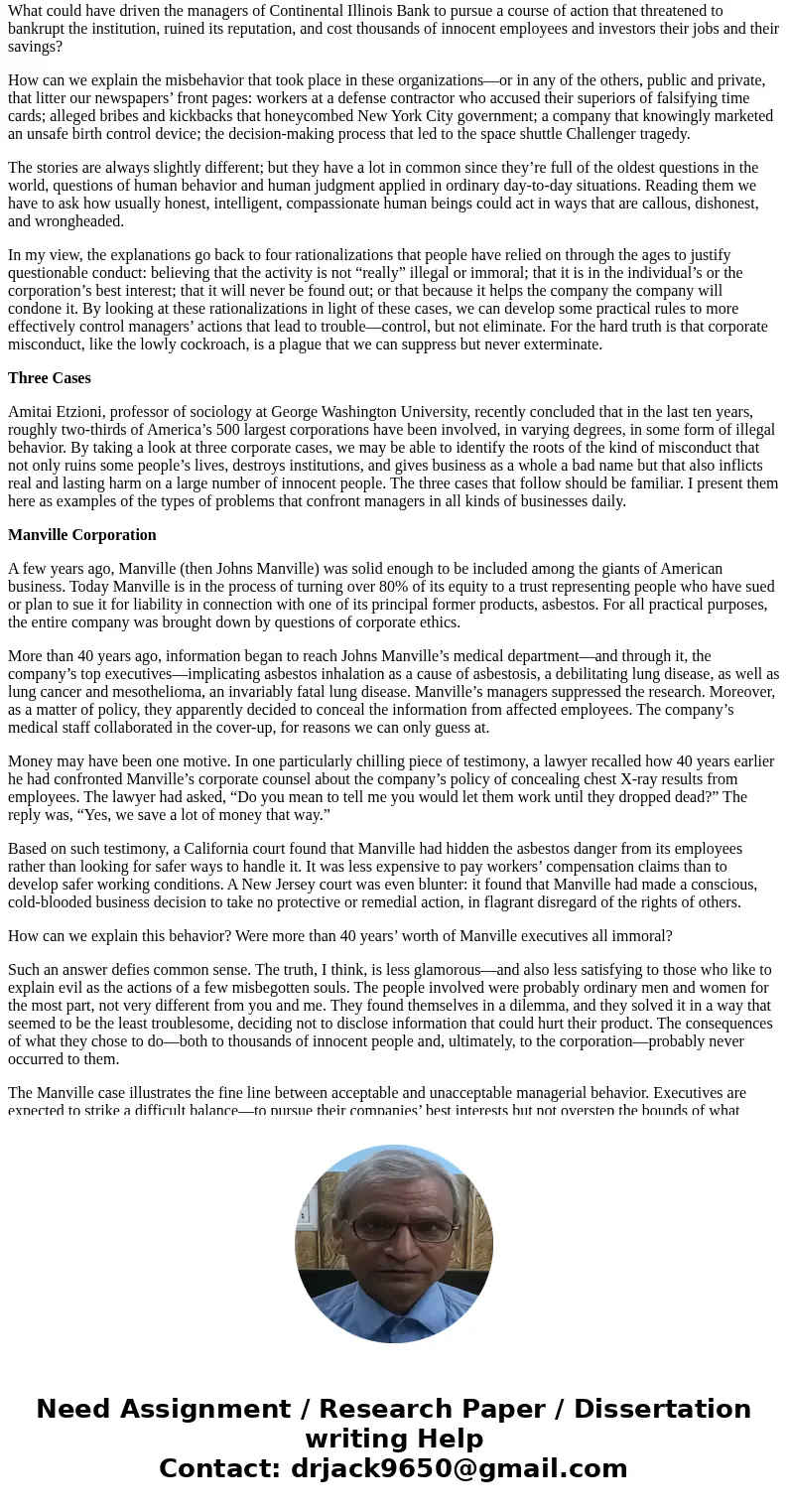
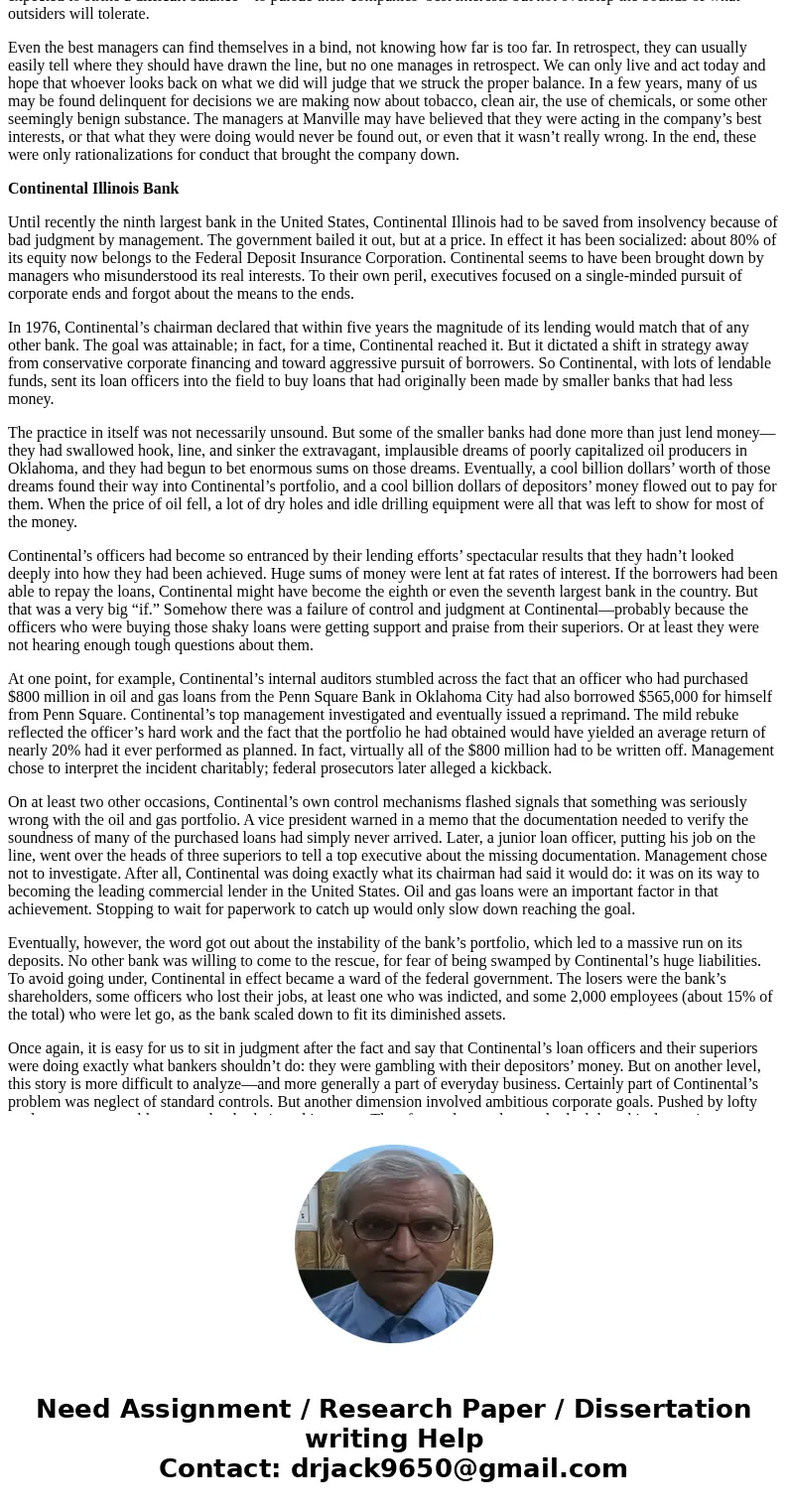
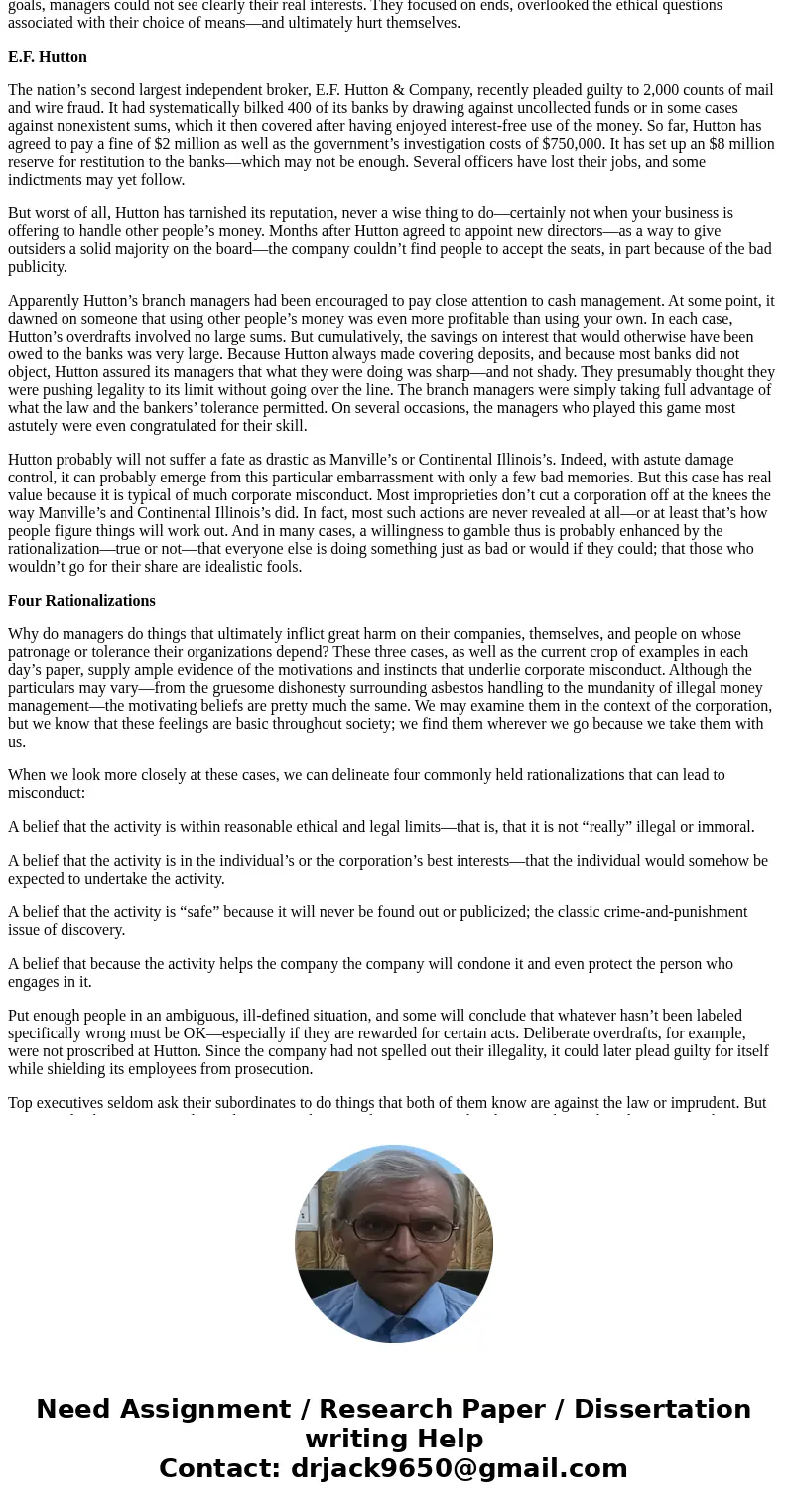
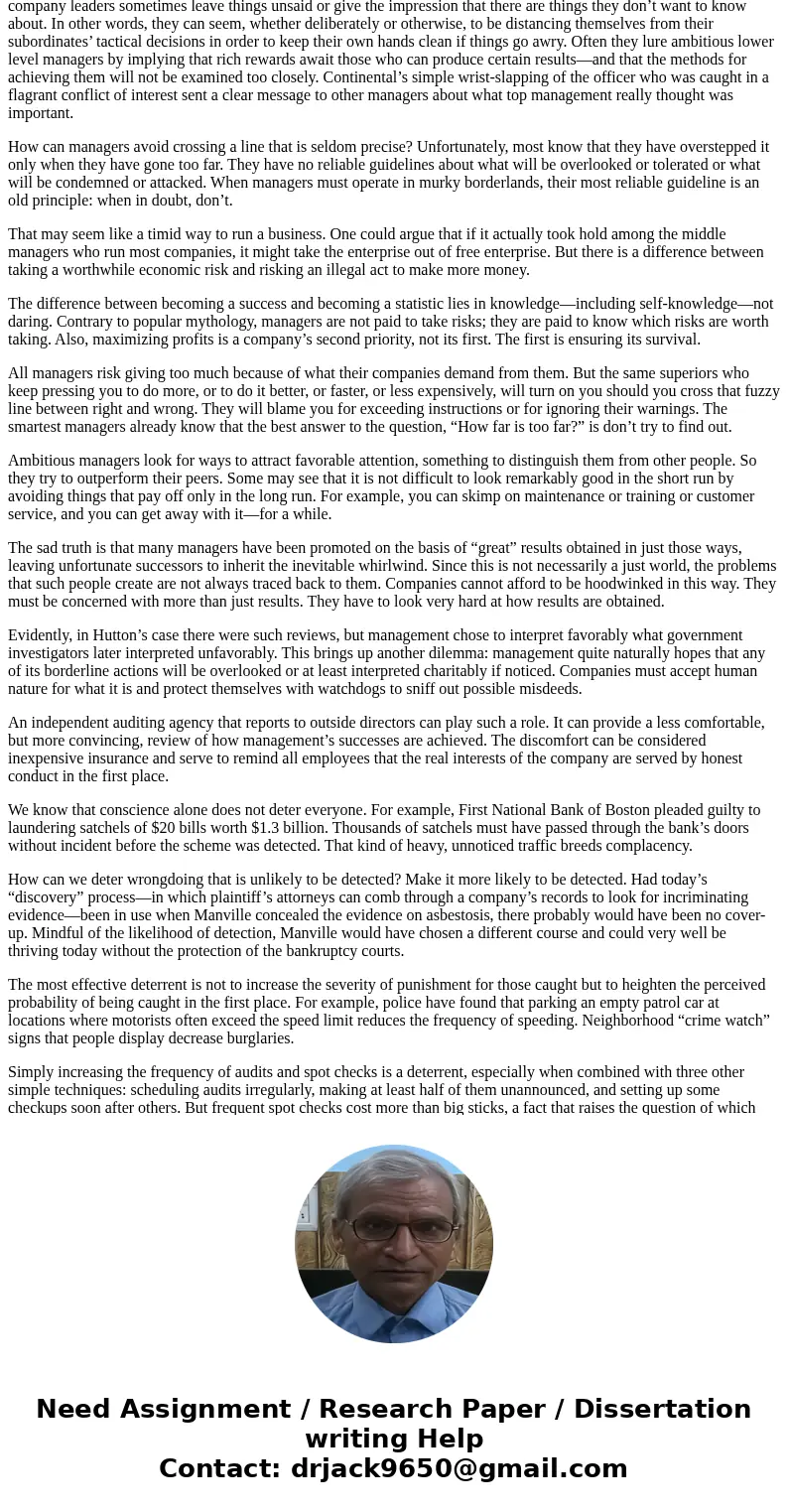
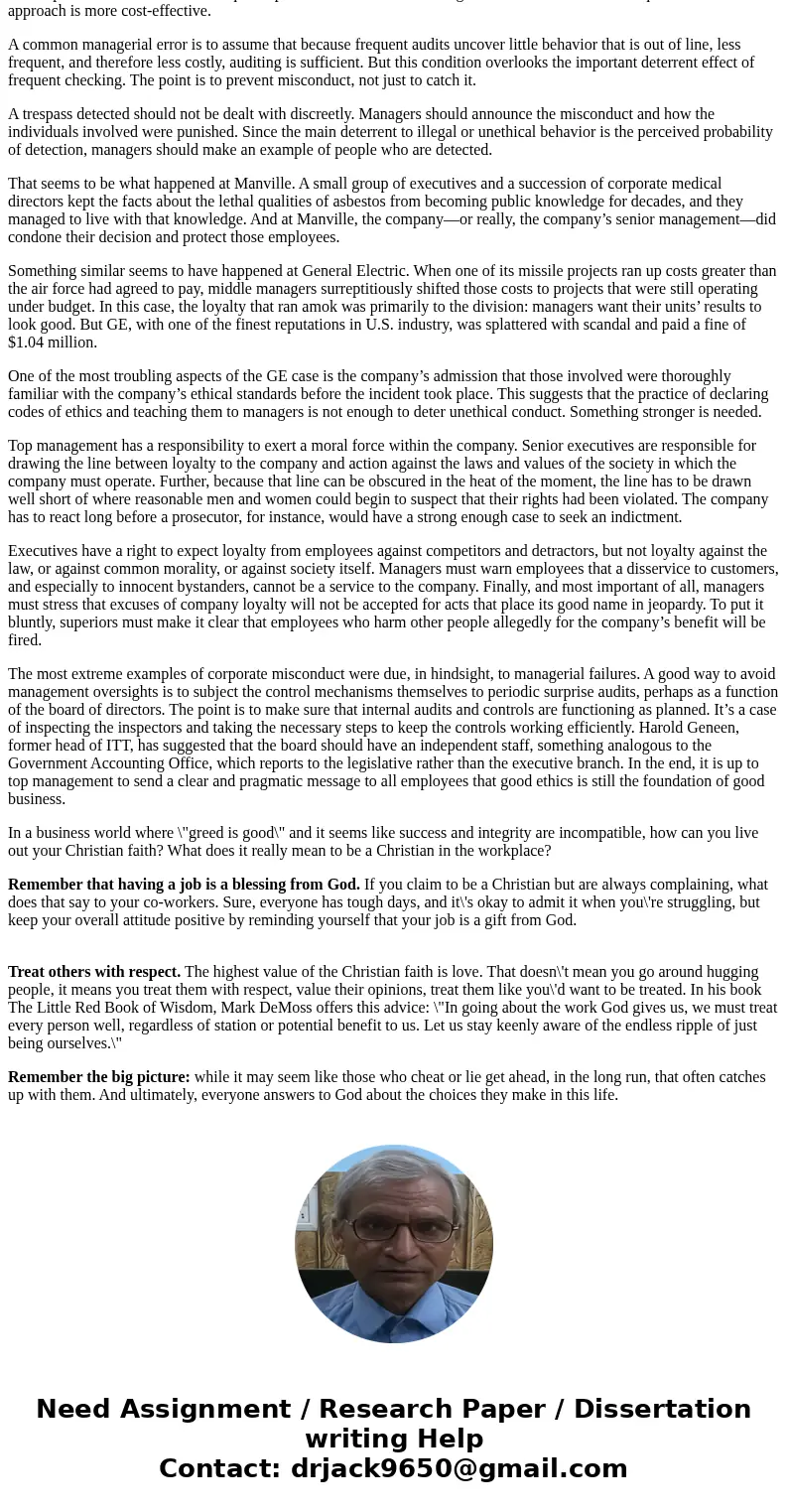
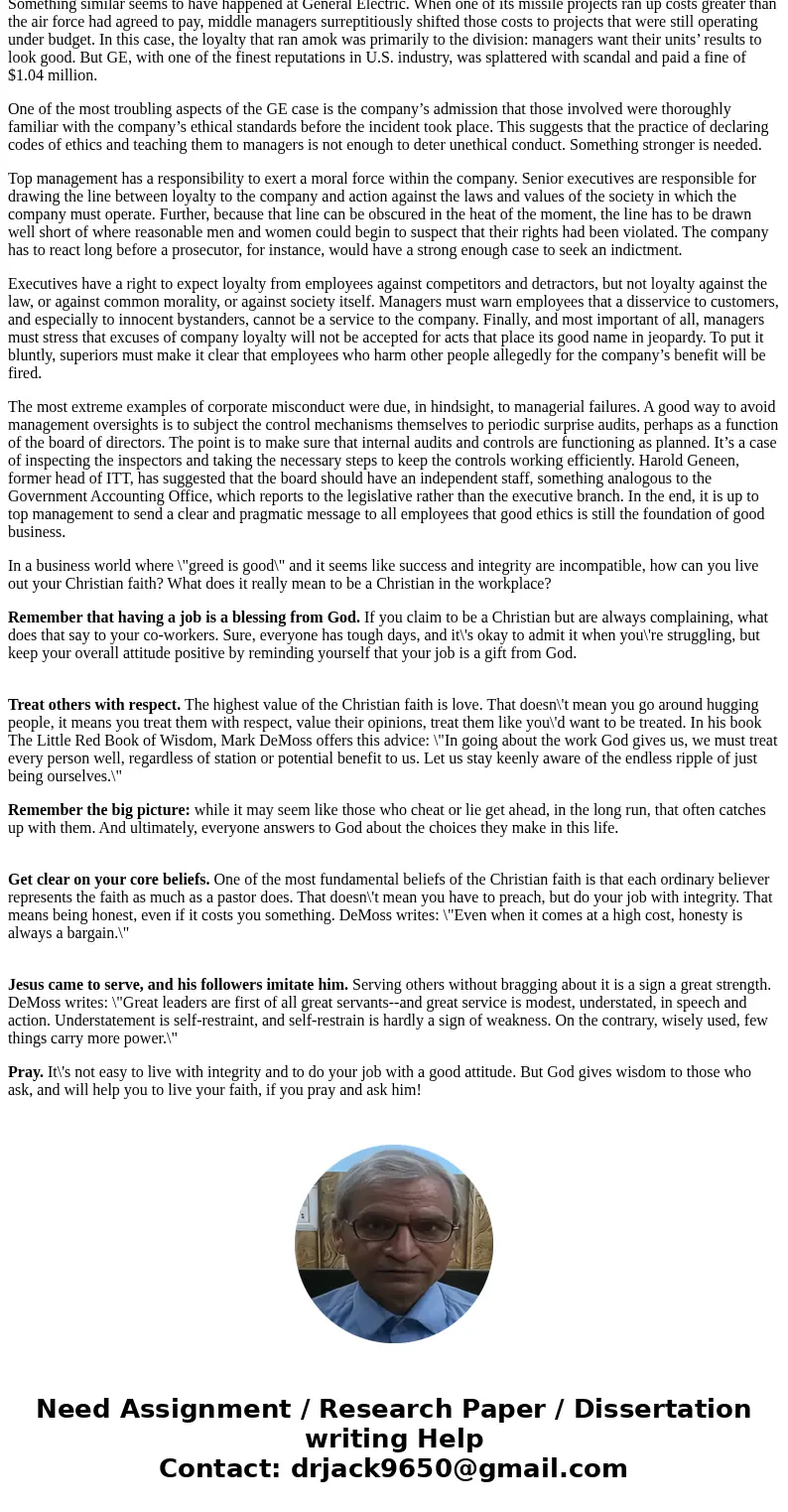
 Homework Sourse
Homework Sourse